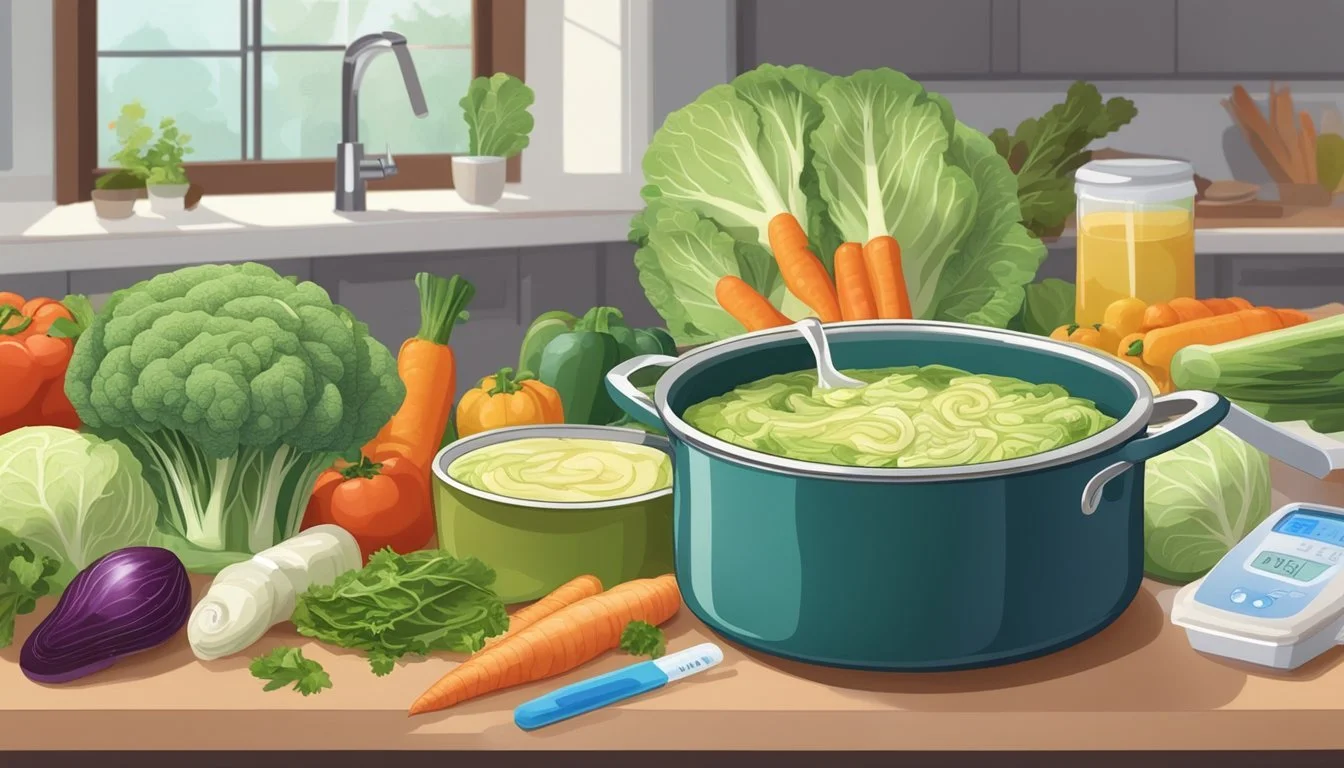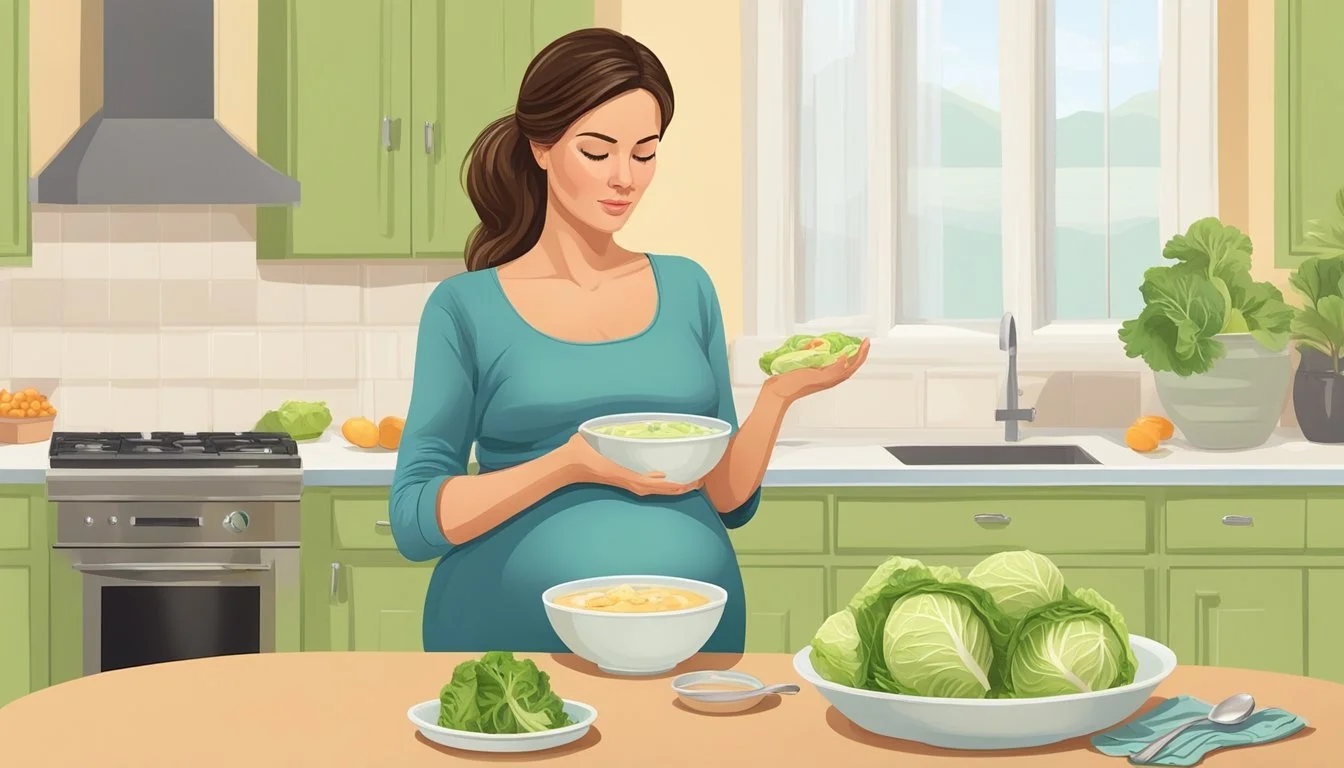Is It Safe to Follow the Cabbage Soup Diet During Pregnancy?
Analyzing Nutritional Impacts
Cabbage is a nutritious vegetable with an array of health benefits, making it a popular food choice for many, including pregnant women. It is low in calories, high in dietary fiber, and provides essential nutrients necessary for a healthy pregnancy. However, adopting extreme diets during pregnancy, such as the cabbage soup diet, warrants careful consideration. The cabbage soup diet is typically a short-term weight loss plan that involves consuming large quantities of cabbage soup for a week, with a few additional permitted foods.
During pregnancy, the body's nutritional demands increase to support the developing fetus's growth and the mother's health. While cabbage itself is a valuable addition to a pregnant woman's diet due to its high folate content and benefits in digestion, the restrictive nature of the cabbage soup diet does not align with the varied and balanced dietary intake recommended for pregnancy. A diet limited to cabbage soup could lead to inadequate intake of calories, protein, healthy fats, and a range of vitamins and minerals that are essential for the well-being of both mother and child.
Healthcare professionals usually advise against engaging in restrictive dieting practices like the cabbage soup diet during pregnancy. Ensuring a balanced and nutrient-rich diet is paramount for both fetal development and maternal health. Moreover, it is essential to consult a healthcare provider before undertaking any dietary changes to determine the best course of action during this critical life stage.
Cabbage Soup Diet Overview
The Cabbage Soup Diet is characterized by its low-calorie intake and short-term focus. This diet has its roots in purported quick weight loss strategies, with a specific emphasis on a high-fiber, low-fat soup as its staple.
Origins of the Cabbage Soup Diet
The Cabbage Soup Diet, often viewed as a fad diet, has an unclear origin but rose to popularity in the late 20th century. It was purportedly used by individuals looking to drop pounds quickly, sometimes for special events. Despite numerous names and variants, the core idea remained the same: consume large amounts of a low-calorie cabbage soup over seven days.
Diet Structure and Common Ingredients
The central component of the Cabbage Soup Diet is a broth-based soup made with cabbage, a cruciferous vegetable known for being rich in vitamins and fiber. The typical recipe includes:
Cabbage: A low-calorie vegetable, high in fiber and water.
Various vegetables: Such as tomatoes, which add flavor and nutrients with minimal calories.
Protein: Included on certain days, often as skim milk, beef, or chicken.
Fruit: Most fruits are allowed, except bananas, which are typically included later in the week.
Brown rice: Sometimes included towards the end of the week.
This regimen encourages large quantities of the soup and certain food groups on specific days, but remains low in calories throughout.
Potential Benefits and Drawbacks
Individuals may experience rapid weight loss on the Cabbage Soup Diet due to its low calorie content and high water intake, which can reduce bloating. The increase in fiber can also aid digestion. However, the diet's sustainability is questionable due to its restrictive nature and potential nutrient deficiencies. It may also lead to side effects like gas and bloating in the short term. While short-term weight loss can be achieved, long-term health benefits are unlikely without balanced nutrition and regular exercise.
Nutritional Considerations During Pregnancy
During pregnancy, the need for specific nutrients increases to support both the mother's and the baby's health. Ensuring a diet rich in essential nutrients while being mindful of potential deficiencies is critical.
Essential Nutrients for Pregnancy
Pregnancy demands an increase in certain nutrients to ensure the development and health of the fetus as well as the well-being of the mother. Key vitamins and minerals include:
Folate (Folic Acid): Critical in preventing neural tube birth defects like spina bifida.
Calcium: Essential for developing the baby's bones and teeth.
Iron: Necessary for preventing anemia and delivering oxygen to the fetus.
Vitamin K: Supports bone health and plays a role in blood clotting.
Antioxidants and Anthocyanins: Help protect cells and may reduce the risk of certain cancers.
It is also important to focus on a diet with fruits and vegetables to provide a spectrum of other essential vitamins and minerals. Such foods, rich in fiber, help combat common issues during pregnancy like constipation and inflammation and are crucial in maintaining a healthy immune system. A balance of energy-dense foods can keep energy levels adequate without excessive weight gain.
Risks of Nutritional Deficits
A lack of essential nutrients during pregnancy can lead to several risks:
Anemia: Low iron levels can result in insufficient oxygen being transported to the fetus.
Bone and Dental Issues in the Fetus: Insufficient calcium can affect the development of the baby's skeleton and teeth.
Increased Risk of Birth Defects: Inadequate folate levels are associated with neural tube defects.
Weakened Immune System: Lack of necessary nutrients can weaken both the mother's and baby's immune responses.
Furthermore, an imbalance in potassium and sodium can lead to issues such as high blood pressure, which poses risks during pregnancy. Ensuring food safety and preventing contamination is also a key factor for a safe pregnancy experience, as some foodborne illnesses can have severe consequences for both the mother and the fetus. It is vital to maintain a healthy diet with the right balance of nutrients to prevent these risks.
Is the Cabbage Soup Diet Safe for Pregnant Women?
Pregnancy demands careful attention to nutrition and diet. The Cabbage Soup Diet's safety for expectant mothers necessitates a deep dive into its suitability and nutritional adequacy during this critical time.
Evaluating the Cabbage Soup Diet for Pregnancy
The Cabbage Soup Diet is a short-term weight loss regimen that involves consuming large quantities of cabbage soup over a period of seven days. While cabbage itself is a nutritious vegetable that can be part of a healthy pregnancy diet due to its fiber, calcium, iron, and folate content, this diet's restrictive nature raises concerns during pregnancy.
During this crucial period, women's bodies require a balanced intake of vitamins, minerals, and adequate calories to support fetal growth and development:
Nutrients: The diet lacks essential nutrients such as protein, carbohydrates, and fats, which are vital for both the mother and the developing fetus.
Calories: The diet is low in calories, risking inadequate energy intake for the increased metabolic demands of pregnancy.
Additionally, the restrictive nature of the diet may expose pregnant women to the risk of electrolyte imbalances and inadequate fluid intakes, risking potential complications.
Registered Dietitian's Perspective
Consulting with a registered dietitian is paramount when considering dietary changes during pregnancy. Dietitians typically advise against adopting highly restrictive diets like the Cabbage Soup Diet due to potential nutritional gaps and the importance of a balanced diet that fosters proper fetal development and maternal health.
A dietitian would emphasize the importance of including a variety of foods to ensure sufficient intake of all critical nutrients. Moreover, they would raise concerns regarding the potential for food-borne illness from improperly stored or handled soup, which could be particularly hazardous during pregnancy.
In terms of the Cabbage Soup Diet, dietitians may highlight the following:
Risks: Potential risks include inadequate nutrient supply and the possibility of food-borne illness due to the monotony of the diet.
Electrolyte Balance: The lack of diversity in the diet may lead to imbalanced electrolyte levels, which are critical for cellular function and fluid balance.
In summation, while cabbage can be a nutritious component of a pregnant woman's diet, the Cabbage Soup Diet itself is not recommended for pregnant women due to the reasons outlined by dietetics professionals.
Cabbage and Its Effects on Pregnancy
Cabbage can be a nutritious food choice during pregnancy, offering health benefits due to its fiber and nutrient content. However, there are certain concerns associated with its consumption which should be taken into account by expectant mothers.
Health Benefits of Cabbage
Cabbage is a powerhouse of nutrients beneficial for both the mother and the developing fetus. Rich in vitamin K, which is crucial for normal blood clotting, it ensures proper physiological functions during pregnancy. Fiber is abundant in cabbage, aiding in digestion and helping to manage common pregnancy-related digestive issues such as constipation.
Cabbage is also packed with antioxidants, including beta-carotene, which supports the immune system. Both red and green varieties of cabbage are low in calories yet highly nutritious, making them an excellent addition to a balanced pregnancy diet. Fermented cabbage, like sauerkraut, contains probiotics which can contribute to a healthy balance of bacteria in the gut.
Concerns with Cabbage Consumption During Pregnancy
Although cabbage is healthy, certain precautions are necessary when consuming it during pregnancy. Raw cabbage could potentially harbor food-borne illnesses like listeria; thus, it is safer to consume it cooked. Fermented cabbage products such as sauerkraut should be chosen with care due to their salt content, as excessive salt intake can lead to complications in pregnancy.
Furthermore, overconsumption of cabbage, particularly varieties like coleslaw which may contain raw cabbage and high-calorie dressings, should be avoided. Cooking cabbage can reduce the risk of bacteria such as listeria. Also, since it is a cruciferous vegetable, excessive consumption of cabbage might lead to gas and bloating, making moderate intake important.
Alternatives to the Cabbage Soup Diet
Expecting mothers looking for safe and nutritious diet options can consider balanced meal planning or incorporating cabbage soup into an overall healthy pregnancy diet. It is important to include a variety of foods that provide essential nutrients for both mother and baby.
Balanced Meal Planning for Pregnancy
A balanced meal plan during pregnancy should include an array of nutrient-dense foods to support the growth and development of the baby and maintain the mother's health. A thoughtfully crafted meal plan focuses on incorporating:
Fruits and Vegetables: A colorful selection of fruits and a generous array of vegetables to provide vitamins and fiber. Particularly, leafy greens like spinach are rich in folate, vital for fetal development.
Lean Proteins: It is important to include lean proteins such as chicken and fish, which are excellent sources of essential amino acids and other nutrients. Fish, in particular, provides omega-3 fatty acids beneficial for the baby's brain development.
Whole Grains: These are a great source of sustained energy through carbohydrates and also offer important vitamins and minerals.
Dairy: For calcium and protein, low-fat or fat-free dairy options can be included.
A balanced plate might look like this:
Food Group Examples Quantity Fruits and Vegetables Spinach, zucchini, tomatoes 5-10 servings per day Lean Proteins Fish, chicken, legumes 2-3 servings per day Whole Grains Brown rice, quinoa, whole wheat bread 6-8 servings per day Dairy Milk, cheese, yogurt 3 servings per day
These elements should be proportionally balanced across meals to ensure a well-rounded intake of essential nutrients.
Incorporating Cabbage Soup into a Healthy Pregnancy Diet
While the cabbage soup diet itself is not a recommended plan during pregnancy due to its restrictive nature, cabbage soup can be included as part of a nutritious diet. When adding cabbage soup to a pregnancy diet, consider the following:
Use cabbage soup as an appetizer or a side dish rather than the focal point of every meal, ensuring a diverse intake of nutrition.
Prepare the soup with a variety of vegetables and add lean protein such as chicken to enhance its nutritional value.
Avoid excessive sodium and incorporate fresh vegetables like tomatoes, zucchini, and spinach for their health benefits.
The soup can complement a meal that includes a serving of whole grains and a side of lean protein for a balanced approach.
Cabbage soup can be a comforting and nutritious addition when enjoyed with moderation and as a part of a comprehensive meal plan tailored for pregnancy.
Potential Dietary Adjustments
Pregnancy necessitates nutritional modifications to support both the mother’s and baby’s health. Incorporating essential nutrients while ensuring food safety is paramount.
Modifying the Cabbage Soup Diet for Pregnancy
The cabbage soup diet is traditionally low in calories and lacks certain nutrients vital for the healthy development of a fetus. To adjust this diet for pregnancy, one must consider the inclusion of diverse food groups that are rich in vitamins and minerals required during this crucial time.
Fruits and Vegetables: While the traditional diet allows for certain fruits and unlimited vegetables, it is imperative to include a variety of them. Bananas, often excluded in the cabbage soup diet, are an excellent source of potassium and should be incorporated. Additionally, dark leafy greens can provide necessary folate, iron, and calcium.
Protein: Adequate protein intake is critical during pregnancy. Lean proteins such as chicken, fish, or skim milk can be added. These modifications not only make the diet safer but also help in the development and growth of the baby.
Whole Grains: Introduce whole grains into the diet to provide essential B vitamins and fiber, promoting maternal digestive health and providing sustained energy.
Hydration: Prioritizing hydration, leaning towards water over black coffee, is critical. It is recommended to drink at least 8-10 glasses of water daily to support the amniotic fluid levels and decrease the risk of urinary tract infections.
Homemade Cabbage Soup: Prepare cabbage soup at home to minimize the risk of foodborne illnesses that are more dangerous during pregnancy. Homemade preparations also allow for controlling the quality of ingredients, reducing the intake of excess sodium which is common in pre-packaged options.
Additional Nutrients: Special attention should be given to calcium and iron, which can be included by adding skim milk to the diet and incorporating iron-rich foods respectively. This ensures the diet supports healthy bone development and decreases the risk of preterm birth and low birth weight.
Through these targeted dietary adjustments, the cabbage soup diet can be tailored to meet the heightened nutritional requirements during pregnancy while prioritizing the safety and health of both mother and child.
Conclusion
When considering the cabbage soup diet during pregnancy, safety and nutrient adequacy take precedence. This diet is typically low in calories and may lack essential nutrients which are crucial during pregnancy. It is not considered a healthy or sustainable weight loss option for expectant mothers due to its restrictive nature.
The diet’s primary focus is on cabbage soup, which, while cabbage is a good source of some vitamins and fiber, does not provide the comprehensive nutrition that both the mother and developing fetus need. Key elements such as iron, calcium, and folate are crucial in pregnancy but are not sufficiently supplied by this diet alone.
Expectant mothers should seek a balanced diet that supports healthy weight management and provides a wide array of nutrients. Consulting healthcare providers for personalized dietary guidelines is the safest approach. They may recommend incorporating cabbage into a well-rounded diet, while cautioning against the single-food focus of the cabbage soup diet.
Weight loss should not be the main goal during pregnancy. Instead, supporting the health of the mother and the baby should be the priority. Nutritionally rich eating habits not only foster a healthy environment for fetal development but also prepare the body for the demands of childbirth and lactation.
In conclusion, while cabbage can be part of a healthy pregnancy diet, exclusively following the cabbage soup diet is not safe or appropriate for pregnant women.








